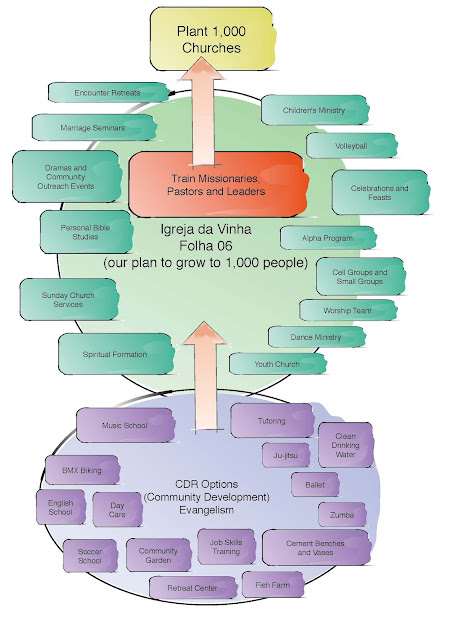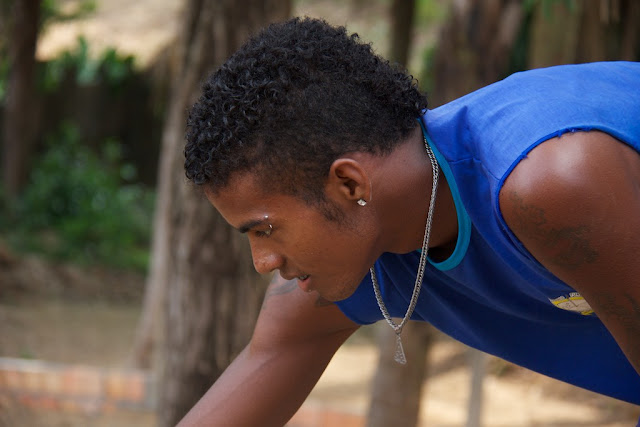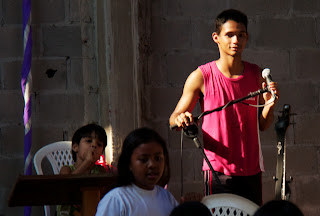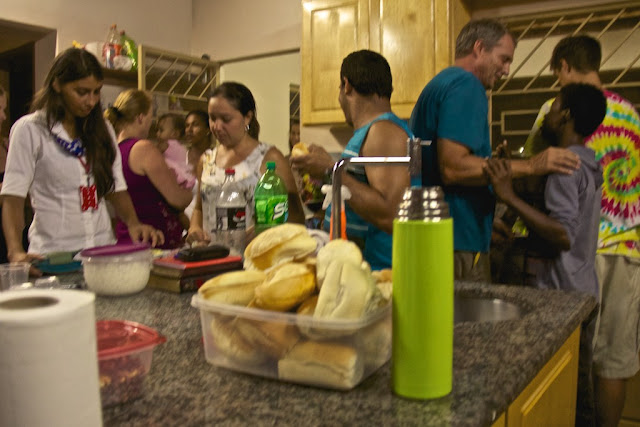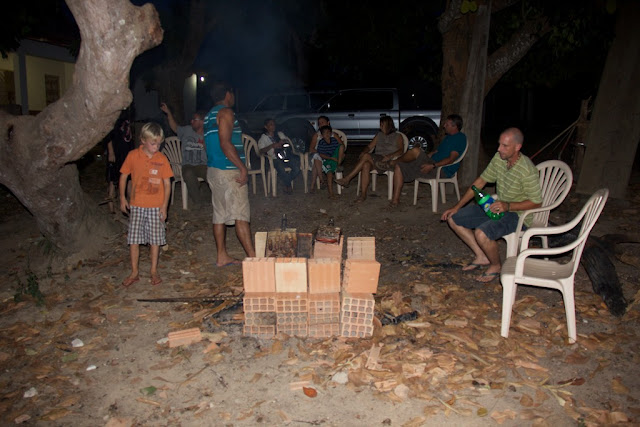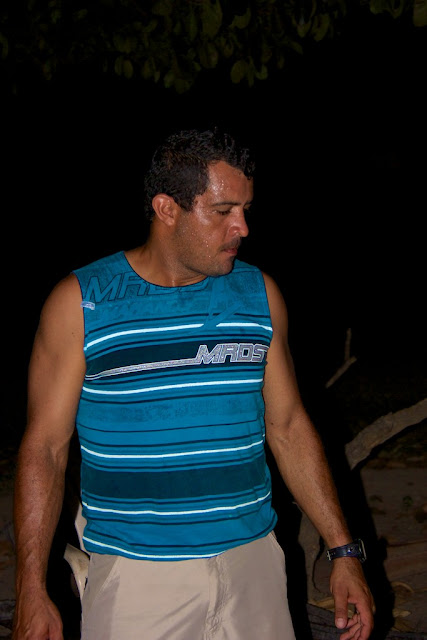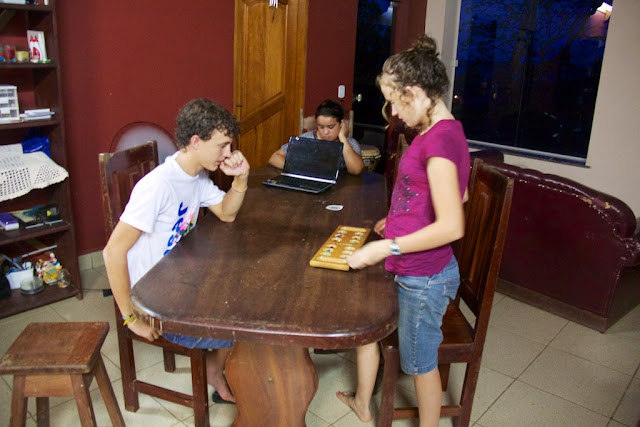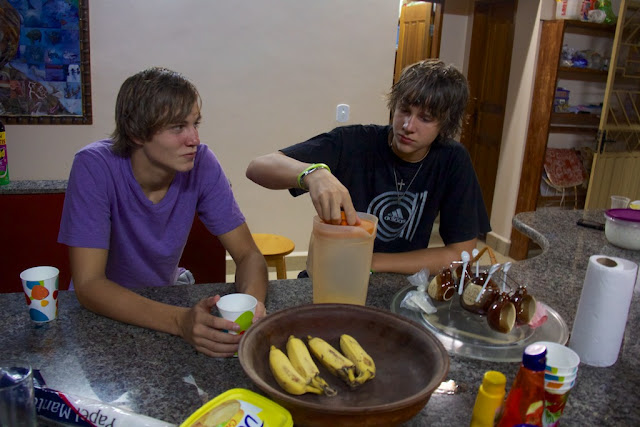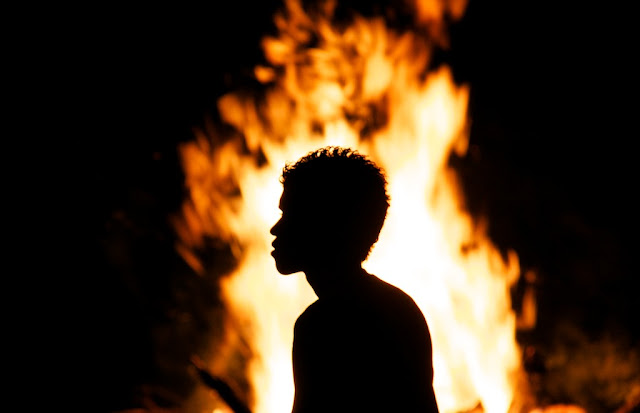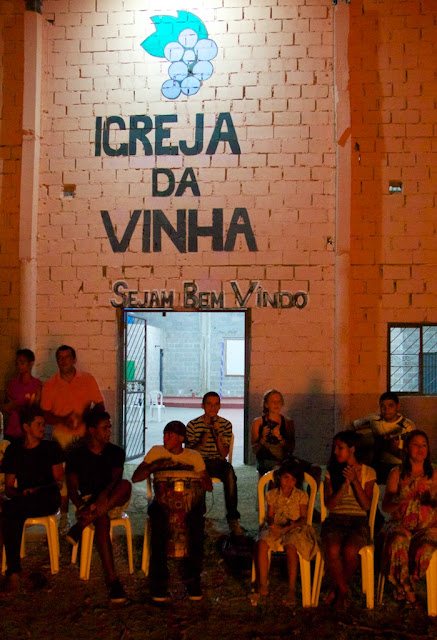I just got back from a bus trip to Altamira. On the way there the Sem Terras (a political movement) had the highway barricaded so we went the long way around the dam. There is paving and road work going on as the Xingu hydro project is underway, but it was still 15 hours getting to Altamira, and 14 hours getting home. On the way home I took the all night bus, as there is no talk of armed robberies and highway bandits.
Adriano
by
Adriano was getting a snack at a store right near our house when a fellow came in to shoot another guy. He missed his target, but accidentally hit Adriano in the leg. Adriano was in the hospital all night before the doctor had time to pull the bullet out, clean the wound, and sew up the wound yesterday morning. Thankfully the bullet stopped at the bone, and did not hit any major nerves or arteries.
Adriano really likes us, and hangs out at the church a lot. He is the only person I have had to escort off the property for exceedingly disruptive behavior during a service. At the next Sunday service he was back, and he managed to sit a little quieter. I feel really sorry for kids like Adriano. He does not know his dad. He lives in a shack with his mom. She has a few kids with different guys. He does not go to school, and cannot read or write. The other day he begged to come to town with me when I went to buy some rope for a project so I got him a motorcycle helmet and we hung out for awhile.
We ask God for mercy, and try to help when we can…like visiting him when he stops a bullet. Deanna gave him a new shirt for a present and some chocolates. He immediately ate two of the chocolates and gave the third one to his mom.
Hello world!
by
Church Growth Plan
by
To make disciples we need to spend time with people. Forming a church community that eats and studies and plays together is fun, but we have found that these can tend to get ingrown. Over time our language, preferences and inside jokes can make new people feel like outsiders.
Church growth by natural reproduction is really slow.
Church growth by Christians moving over from other churches is complicated.
So how do we attract people who don’t like church?
We are developing another chapter to our work here called CDR. In English, this translates to Center of Regional Development. These are activities designed to meet felt needs in our neighbourhood. Our goal is to build bridges so that church people can hang out with unchurched people. Our hope is that our Christian community and our message will be considered good news.
Iguana
by
This iguana fell out of a palm tree by our church building the other morning. We have quite a few of them around here, from very small to about 5 feet long. This one was about 3 feet long or so. Where we live very few people eat iguanas, though its not completely unheard of. Iguanas like eating the fruit and leaves on the trees on our property. And our dog likes eating the iguanas.
How To Make Disciples
by
How do we make disciples? It’s real simple. We have to hang out with people. We make disciples by doing life together.
My passion is to plant churches because I have seen how the Lord can use them to restore people, families, and neighbourhoods. I also love our social programs. Whether we are playing soccer, teaching English, or meeting a different felt need in our neighbourhoods, social programs can be an excellent way to spend time with people.
People watch how we do life. How do we treat our families? How do we handle disappointment? Does what we teach match how we live? What is our sense of humor like?
As people watch how we lead, live and love, hopefully they will become disciples of Jesus.
When All Else Fails, Worry! | RZIM
by
WHEN ALL ELSE FAILS, WORRY!
Posted on by Stuart McAllister
Sometimes I get the feeling from our media that there is a serious effort underway to keep us all anxious, in a state of informed concern, and always on the alert against—well, everything. Rather than a balanced, more general, and necessary exhortation to be cautious, we seem to manufacture fear. We take the advent of 24/7 news, a proliferation of “experts,” and a deluge of “the latest studies,” and out comes an overdose of worry or outright fear.
Everyday I am told that education standards are falling, the economy is in shambles, crime is rising, my food is dangerous, predators are on the prowl in neighborhoods, my body is under assault from saturated fats, and I can’t trust my bankers, accountants, or politicians. There are religious fanatics on the loose and weapons of mass destruction waiting to get me. Gas prices are rising, work seems hard to get, and on top of it all, the poisoned environment is gearing up to offer a big time payback.
Now, I don’t know about you, but the constant immersion in such things, the saturation of space, and the occupation of time by these ideas, does not add to the balance of hope, expectation, joy, or comfort. Could it be that into this culture framed narrative, we can listen to a word from another century? Jesus, speaking to his disciples, once said, “Do not worry about your life, what you will eat or drink; or about your body, what you will wear” (Matthew 6:25). How on earth can we not worry?
Is this possible, is it practical, is it even real? We have whole industries, massive budgets, and multitudes of people, all whose business is marketing worry. Now I’m not exactly suggesting that there is some large scale conspiracy effort to manipulate us all. What I do mean, however, is that many of us live unreflective lives. We don’t pay much (or any) attention to the things that may deeply influence or affect us. For example, it is a necessary condition of a modern economy to keep us restless, dissatisfied, and always seeking, wanting, striving for things, experiences, stuff, education, honors, fun, or whatever. Yet, this perpetual stimulus, as Kenneth Gergen writes in The Saturated Self, indeed has fallout. It leads, he proposes, to a condition of “multiphrenia.”
We are all used to terms like ADD and many similar symptoms to describe our age. We are distracted, busy, under demand, and more often than not worn out or beaten down. So what can we do to combat these forces that deeply affect us? When I was a child in Scotland, I was taught a basic discipline essential to all children in areas where walking to school by busy roads was the norm. Where crossing roads and moving through traffic was inevitable, the key was learning to do it safely. Hence, we were taught: Stop! Look! Listen! These three words and practices were drummed into us. Let me draw on this.
Learning to stop is often the beginning point in our harassed lives. Simply stop and be still. Then, look. Look around, look within, evaluate, and discern. Next, listen. What do you hear, see, sense? Culture’s invasive power may be resisted by a simple set of steps that break the hold of intrusion and allow us to reestablish our focus (see Matthew 6:33). With a fresh resolve to live differently, listen carefully, and act intentionally, new life and will to live is unleashed. Socrates is identified as having observed that the unexamined life is not worth living. I think for many of us, this is the problem. We simply let life take over, circumstances dominate, and pressures define us. But a spirituality of resistance learns to say no. Writing in a time of great pressure, real danger, and many struggles, Paul said to the Philippians: “Do not be anxious about anything, but in everything, by prayer and petition, and with thanksgiving, present your requests to God.” What can we expect as the outcome? God’s peace will guard our hearts and minds.
There are indeed vested interests in the promotion of worry and the amplification of anxiety. But the Lord of history offers an alternative: Trust in Christ and be anxious for nothing!
Stuart McAllister is vice president of training and special projects at Ravi Zacharias International Ministries in Atlanta, Georgia.
Sammy
by
Keith and Marsha
by
Youth Service Bonfire Night
by
The church youth group had a bonfire service on Saturday, just to break from routine. They built a nice big fire, then they put their chairs quite a ways away, because it is already hot out, this being the tropics and all. They had a worship time, and Monica shared a short message. In spite of the heat Emma came home after and said, “I just love bonfire services. We need to do these more often.”


.jpg)

